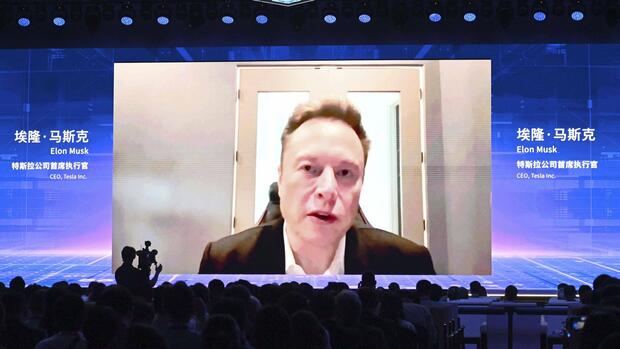The Tesla boss had put the competitors in China under pressure with his price cuts.
(Photo: IMAGO/Kyodo News)
Beijing, Dusseldorf The US carmaker Tesla has reached an agreement with leading Chinese electric car manufacturers that could end the ruinous price competition in China. Sixteen companies including BYD, Geely, Nio and Xpeng signed a memorandum of understanding on Thursday to maintain “fair competition” and avoid “abnormal” prices.
In the agreement, which is considered non-binding, the manufacturers pledge, among other things, to “promote basic socialist values, actively assume social responsibility and assume great responsibility for maintaining steady growth”.
However, the manufacturers probably did not take this step entirely voluntarily. The Ministry of Industry and Information Technology had apparently previously instructed the industry association CAAM to persuade the companies to make the joint statement.
German suppliers have fallen behind in China
At the end of last year, Tesla boss Elon Musk started price competition in the highly competitive market with high discounts. This is the company’s response to falling demand. Many Chinese manufacturers followed suit in order to secure their market share.
This also put German car manufacturers such as BMW, Volkswagen and Mercedes in a difficult position in the world’s largest electric car market. Most recently, the Chinese carmaker BYD managed to replace the core brand Volkswagen as the market leader. Audi, Mercedes and BMW also lagged behind local suppliers in China.
In March, therefore, German car manufacturers lowered their prices in China for the first time, but always emphasized that the discount campaigns were limited in time.
>> Read also: Plants underutilized, dwindling market shares: VW is creating space in China to build electric cars
Volkswagen did not want to comment on the agreement, which was reached on the sidelines of an industry meeting in Shanghai on Thursday. China boss Ralf Brandstätter had previously emphasized in a speech that brands like Volkswagen and Audi were standing for “stability and reliability” – also with regard to the prices. According to Brandstätter, Chinese customers are the victims of the discount battle because the residual value of their vehicles is falling “drastically”.
China has subsidized electric mobility with more than 100 billion dollars
According to the industry association CPCA, 6.5 million vehicles with electric or hybrid drives were delivered in the People’s Republic last year. More than 80 percent came from Chinese manufacturers, above all BYD.
In the past ten years, the Beijing government has subsidized the development of the electric car industry with the equivalent of more than 100 billion dollars. Their goal is to turn local corporations into global market leaders.
The price competition caused the Chinese carmaker to make a higher-than-expected loss.
(Photo: IMAGO/VCG)
However, due to the subsidies, many new providers have dared to enter the market, so that there is high overcapacity. Experts therefore expect a consolidation that only those manufacturers will survive that have reached a certain size and therefore benefit from economies of scale.
>> Read also: The Chinese electric car manufacturer Denza is booming – but only since the separation from Mercedes
Falling prices squeezed sales and profits at more than a dozen Chinese automakers in the first quarter, an analysis by financial services firm Bloomberg shows. Many of the electric car start-ups are not making any money anyway. Nio, which is pushing into the premium segment, posted a significantly higher loss than expected in the first quarter with a loss of the equivalent of almost $700 million.
Some providers have already increased prices again.
This spring alone, the prices of some Tesla models from the US carmaker’s plant in Shanghai were 14 percent lower than the year before. However, there have recently been increasing signs of an end to price competition.
In the past few weeks, the discounts have been lower, and some manufacturers have even increased their prices again. An important reason for this was that sales of electric cars have recently risen sharply again. According to the latest estimates by the CPCA association, deliveries in June were 26 percent higher than in the same month last year. BYD, Nio, Li Auto and Tesla are showing significant growth.
The market was therefore already expecting an end to the price war, said Joanna Chen, an analyst at Bloomberg Intelligence. The car manufacturers would now increasingly rely on new models to boost sales.
In addition to Tesla, BYD, BAIC, Changan, Chery, Dongfeng, JAC, FAW, GAC, Geely, Great Wall, Li Auto, Nio, SAIC, Sinotruk and Xpeng have signed the MOU.
More: Automakers are threatened with the end of “picture book profits” in China
